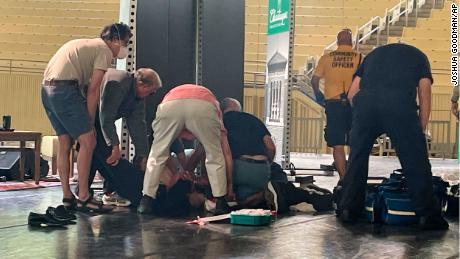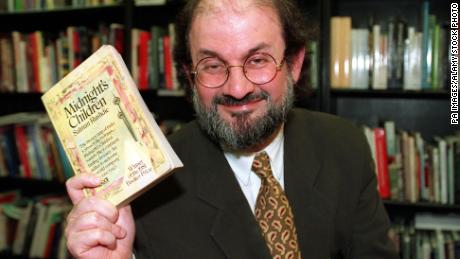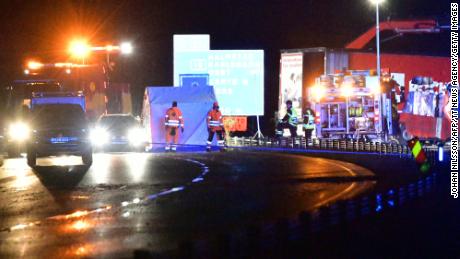Rushdie was on a ventilator Friday night and couldn’t speak, his agent, Andrew Wylie, told The New York Times.
“Salman will probably lose an eye; the nerves in his arm were severed; and his liver was stabbed and damaged,” Wylie told The Times. “The news is not good.”
The suspect has been identified as Hadi Matar, 24, of Fairview, New Jersey, State Police Troop Commander Maj. Eugene J. Staniszewski said at a news conference Friday night. The police said they are working with the FBI and local authorities to determine what might have prompted the attack.
Authorities are also working to obtain search warrants for several items found at the scene, including a backpack and electronic devices, Staniszewski said. Authorities believe the suspect was alone but are investigating “to make sure that was the case,” Staniszewski added.
The suspect jumped onto the scene and stabbed Rushdie at least once in the neck and at least once in the abdomen, state police said. Staff and members of the public rushed the suspect and took him to the ground before a state trooper took the assailant into custody, police said.
Rushdie was airlifted from a field adjacent to the site – in a rural resort town about 70 miles south of Buffalo – to a hospital. Rushdie was undergoing surgery at a hospital in northwestern Pennsylvania, Erie Police Department Deputy Chief William Marucci told CNN Friday night.
New York Governor Kathy Hochul told reporters on Friday that a state trooper “got up and saved (Rushdie’s) life and protected him and the moderator who was also attacked. .
“Here is an individual who has spent decades speaking truth to power,” the governor said of Rushdie. “Someone who has come out fearless, despite the threats that have followed him his entire adult life, it seems.”
The suspect had a “pass to access the grounds,” Dr. Michael E. Hill, president of the Chautauqua facility, said at the news conference.. Customers can purchase passes to attend the programs, Hill added.
“We take our security measures very, very seriously,” Hill said. “We will continue to seek to provide the maximum security that we can…this has never happened in all of our history. Chautauqua has always been an extremely safe place and we will continue to work to maintain that tradition,” Hill said.
Authorities are working with the district attorney’s office to determine what charges will be brought against the suspect “once we get a little further into the investigation and determine Mr. Rushdie’s condition,” Staniszewski said.
Meanwhile, Fairview police blocked off the street from a house believed to be linked to the suspect and were not allowing anyone, including street residents, to enter or leave the area.
What the witnesses say happened
Rushdie was introduced around 10:45 a.m. when the assault happened, according to a witness, who said he heard screams in the audience. He said a man in a black shirt appeared to be “hitting” the author. The witness, who was 75 feet from the scene, did not hear the attacker say anything or see a weapon.
Some people in the audience ran to lend a hand while others tackled the attacker, the witness said. State police said a doctor who was in the audience at the event helped Rushdie until help arrived.
Joyce Lussier, 83, who was in the second row of the amphitheater during the attack, said Rushdie and Reese had been seated on the right side of the stage when suddenly a man who appeared to be in all black “wobbled across the stage and went straight to Mr. Rushdie.
“He came over to the left side and jumped across the stage and lunged at him. In, I don’t know, two seconds he crossed that stage,” Lussier said. She added that she could hear people screaming and crying and saw people from the audience rushing onto the stage.
“They caught him right away, he didn’t come off stage at all,” Lussier said of the suspect. Shortly after, the crowd was told to evacuate, she added.
Another witness told CNN there were no security searches or metal detectors at the event. The witness has not been identified because he expressed concerns for his personal safety.
The witness said the attacker “walked quickly” down an aisle and jumped onto the stage, approaching the perpetrator and “repeatedly making a stabbing motion with his hand”.
A third witness, a longtime Chautauqua resident who asked not to be identified, recalled a commotion on stage and a man making about seven to 10 stabbing motions toward the perpetrator, who was halfway upright. She said she fled the outdoor amphitheater “shaking like a leaf” in fear.
“His essential voice cannot and will not be silenced”
In a statement, the nonprofit education and resort center said it was “coordinating with law enforcement and emergency officials a public response following today’s attack. by Salman Rushdie on the stage of the Chautauqua amphitheater”.
Writers such as Stephen King and JK Rowling expressed their best wishes for Rushdie via Twitter.
“We can think of no comparable incident of a violent public attack on a literary writer on American soil,” PEN America CEO Suzanne Nossel said in a statement.
“We fervently hope and believe that his essential voice cannot and will not be silenced.”
Rushdie was harassed by “The Satanic Verses”
The 75-year-old novelist, the son of a successful Muslim businessman in India, was educated in England, first at Rugby School and then at Cambridge University where he earned a master’s degree in history.
After college he began working as a copywriter in London, before publishing his first novel, “Grimus” in 1975.
Rushdie’s treatment of sensitive political and religious subjects made him a controversial figure. But it was the publication of his fourth novel “The Satanic Verses” in 1988 that haunted him for more than three decades.
Some Muslims found the book sacrilegious and it sparked public protests. In 1989, the late Iranian leader, Ayatollah Ruhollah Khomeini, called Rushdie a blasphemer and said “satanic verses” were an insult to Islam and the Prophet Muhammad, and issued a religious edict, or fatwa, calling for his death.
As a result, the Mumbai-born writer spent a decade under British protection.
In 1999, Rushdie told CNN the experience had taught him “to value even more … intensely the things that I used to value, like the art of literature and the freedom of expression and the right to say things other people don’t like.
“It may have been an unpleasant decade, but it was the right fight, you know. It was about fighting for the things I believe in the most against the things I hate the most, which is bigotry. , fanaticism and censorship.”
The bounty against Rushdie was never lifted, although in 1998 the Iranian government sought to distance itself from the fatwa by pledging not to seek execution.
But despite what appeared to be a relaxation of the fatwa, more recently Iran’s Supreme Leader Ayatollah Ali Khamenei reaffirmed the religious edict.
In February 2017, on Khamenei’s official website, the supreme leader was asked if the “fatwa against Rushdie was still in effect”, to which Khamenei confirmed that it was, saying: “The decree is as that Imam Khomeini published”.
CNN’s Liam Reilly, David Romain, Nicki Brown, Christina Maxouris, Jonny Hallam, Paul P. Murphy, Artemis Moshtaghian and Mark Morales contributed to this report.



